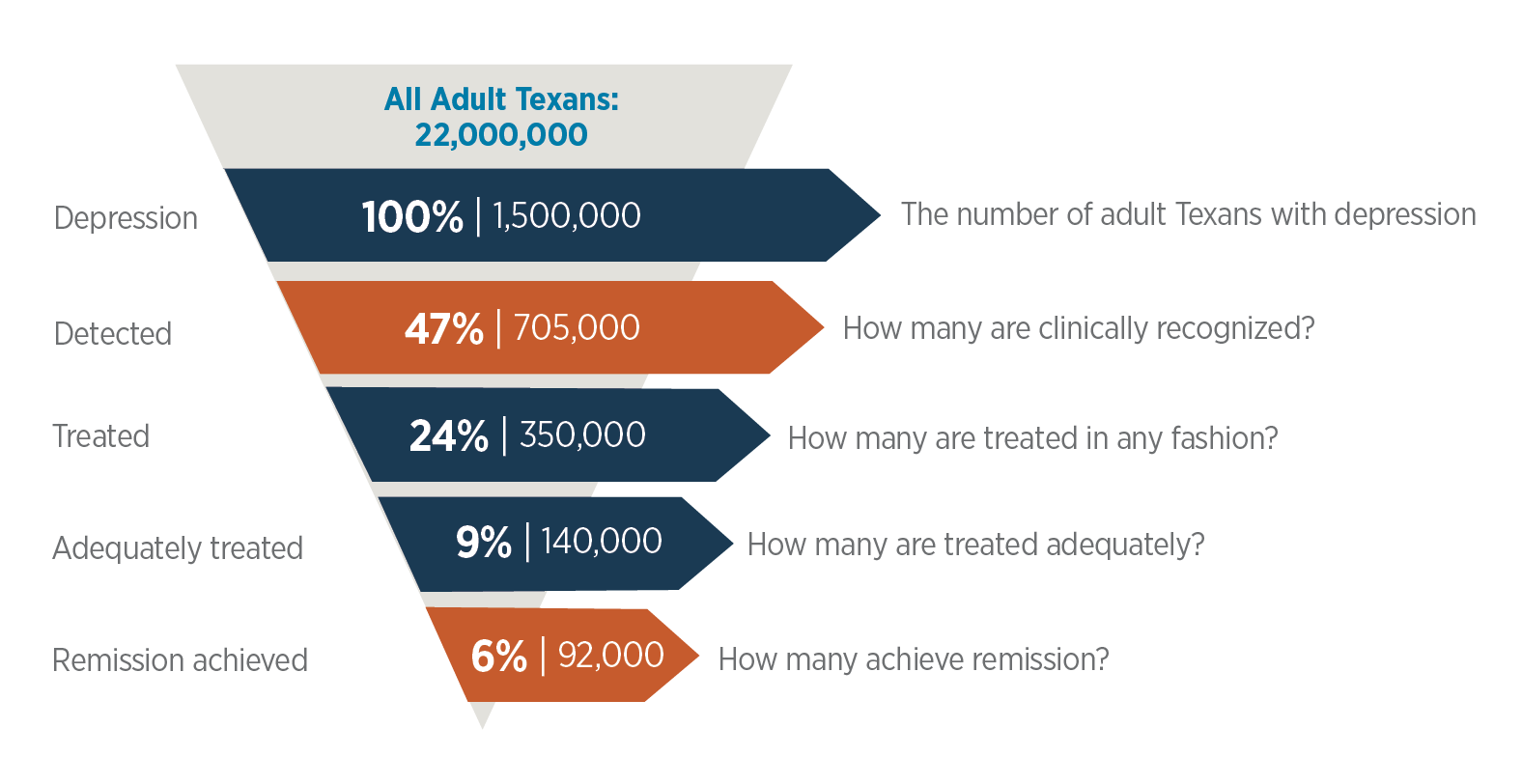A collaborative effort to treat mental illness is growing faster and spreading wider than anticipated.

In 2020, Meadows Mental Health Policy Institute came up with a new strategy to take on the daunting challenge of helping millions of people recover from depression.
The approach was a collaboration of three proven mental health efforts that enhance primary care treatment for depression, support businesses to improve mental health and substance abuse care, and train frontline health workers to deliver brief care for mental disorders. Woven into that collective strategy were partnerships with prominent institutions that would enhance the concept’s effectiveness and expand its reach.
The new approach caught the attention of people positioned to do something assertive with it.
In June of 2021, the Meadows Institute was awarded the $10 million Lone Star Prize, from a competition funded by Lyda Hill Philanthropies and managed by Lever for Change. The competition goal was to activate ideas that improve the quality of life and health access for communities across Texas.
Since receiving the prize, the Meadows Institute, based in Texas, and its partners have grown the initiative faster and spread it wider than anticipated—unlocking hundreds of millions of dollars for mental health work—largely by drawing others to join the initiative or replicate it.
Also, in the largely rural Texas panhandle, the Amarillo Area Foundation gave Meadows $500,000 to begin working in the region early. It is the start of what is expected to be a multi-year effort.
And the state of Texas has committed $7 million of American Rescue Plan Act funding to expand mental health services for children across the state.
Nationally, federal legislation passed in 2022 directs as much as $240 million over the next four years to scale up mental health initiatives, modeled on the Meadows Institute's work, across the U.S. In addition, the Meadows Institute's partnership with A Path Forward, which enhances employers’ mental health coverage, will use an additional nearly $2 million from a network of funders to expand the Meadows Institute's effort nationwide.
“That’s where I think the Lever for Change framework is so valuable,” said Andy Keller, President and CEO of Meadows Mental Health Policy Institute. “We leveraged something by not only growing it but by catalyzing bigger changes just in the first 18 months. Had the Lone Star Prize not been awarded and without the rigor of the Lever for Change process, none of this would have happened.”
“This approach is taking away that overwhelming burden that resulted in providers leaving the healthcare system,” he said. “Now the model is helping retain them. They’re saying, ‘I love my work again because I know it’s making an impact; I know it’s actually changing people’s lives and they’re getting better.’”
Hani Talebi, Chief Clinical Officer and Senior Vice President for Health Systems Integration at Meadows
Researchers, practitioners, and policy experts
Beyond financial support, the Meadows Institute partnerships with three venerable institutions—University of Texas Southwestern Center for Depression Research and Clinical Care; and Social Medicine at Harvard Medical School—brings together academic researchers, practitioners, and policy experts to focus on the issue.
The Harvard collaboration carries the additional prospect of international expansion via the department’s longstanding working relationship with Sangrath, a nongovernmental community health organization in India.
In Texas, the Meadows Institute's primary goal is to increase the rate of recovery from depression to more than 50 percent through early detection and treatment in primary care. Today, that recovery rate is 10 percent. If successful, an estimated 500,000 Texans would recover from the diagnosis and upwards of 1,000 lives a year would be saved, Keller said.
Early data indicates that those objectives are within reach.
Baseline remission from depression is at 42 percent for those who have received treatment from the Meadows Institute's model or approaches based on it, Keller said. The Meadows Institute's original plans called for working in two of Texas’ eight health care regions. The collaborative now works in six.
And initial proposals to work with 8 health systems have grown. A total of 18 health systems, serving 4.3 million people, have committed to making the initiative available to everyone the systems serve.

Rigorous assessment
The origins of the Lone Star Prize started in early 2020, when Lyda Hill Philanthropies was looking for a bold way to fund transformational progress in science and nature, empower nonprofit organizations, and improve communities in the Lone Star State.
The Texas organization, named for the venerable Dallas entrepreneur who—along with Dolly Parton—recently was awarded the Carnegie Medal of Philanthropy, decided the best approach would be to partner with Lever for Change on a prize competition.
Launched in early 2020, the Lone Star Prize competition received more than 172 proposals.
Before the top prize was awarded, the Meadows Institute and other participants went through a rigorous assessment that included an evaluation by peer applicants and 200 experts in the field followed by additional technical assistance and more vetting. The review focused on four criteria: the projects had to be transformative, scalable, feasible and evidence based.
“The Lever for Change process really forced us and all of the participants to bring real data together,” Keller said. “The proposal we put together was probably the most rigorous thing we’d ever done.”
The level of rigor was “super fun,” he said, and “it’s been really helpful for us exacting a level of rigor out of our partners” that other grants typically do not require.
That approach and Lever for Change’s overall expertise was particularly valuable to Lyda Hill Philanthropies, which has a lean staff, said the Philanthropies’ CEO Nicole Small and her colleague, Margaret Black, Managing Director of the Philanthropies.
“The opportunity to partner with them both in the region that we cared about and in the subjects that we cared about to think of a different way to identify these opportunities and then deploy capital was really exciting to us,” Small said.
She and Black also said the challenge’s wide-open format attracted worthy, intriguing ideas that largely had languished in obscurity. Four of those were selected as finalists: JUST, which promotes female entrepreneurship; Merit America, a group that works on careers for Texans without bachelor’s degrees; Texas Water Trade, a clean water nonprofit; and an initiative by Rice University’s Baker Institute for Public Policy to establish a soil carbon storage market.
The designation raised the organizations’ profiles in the philanthropic world. Or, as Small said, the Lone Star Prize structure helped her organization “develop a pipeline of projects” that Lyda Hill Philanthropies and other funders in Texas can support.

Improving clinicians’ outlook
As for Meadows Mental Health Policy Institute, the Award is still paying dividends. Beyond expanding faster and covering more territory than anticipated, the Meadows Institute is changing clinicians’ outlook, said Hani Talebi, Chief Clinical Officer and Senior Vice President for Health Systems Integration at the Meadows Insititute.
He recalled his conversation in February with a clinician in the Amarillo area who spoke of sending patients diagnosed with depression outside the community to receive treatment that was unavailable locally. Research shows that patients do not follow those referrals 60 percent of the time.
The clinician knew that and was experiencing what Talebi called “moral injury” from years of being unable to provide what patients needed.
Now, the clinician told Talebi, he can tell patients the treatment is available locally with a team that is familiar to the patient. It gave the clinician a sense of relief and honor that had been missing in his work, Talebi said.
“This approach is taking away that overwhelming burden that resulted in providers leaving the healthcare system,” he said. “Now the model is helping retain them. They’re saying, ‘I love my work again because I know it’s making an impact; I know it’s actually changing people’s lives and they’re getting better.’”